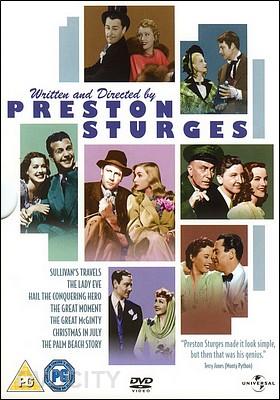Beskrivelse:
Preston Sturges (1898 - 1959) was perhaps the greatest comedy director of the Golden Age of Hollywood. During the Second World War, he created a series of box office hits that have been treasured by movie fans ever since. Fast-moving and packed with physical comedy, slapstick and memorable one-liners, these movies were also years ahead of their time in treatment of sex and morality.
The Great McGinty (1940)
In a dive bar south of the border, a begrudging bartender, McGinty (Brian Donlevy) tries to assuage an embezzling bank clerk on the lam by relating his own reasons for fleeing to the banana republic. He was mayor of a big city, and from this unsuspected revelation ensues a sweeping look at McGinty's seedy journey from tough-guy bum to mob lackey. A tip-off that there's money in voting for the corrupt incumbent mayor leads McGinty to the belligerent mob Boss who runs the city, and is so taken with McGinty's street wise charms that he takes him under his wing. When the mayor is exposed by the press, the Boss proposes McGinty as the reform party candidate complete with a quickly arranged marriage to his sweet-faced secretary, Catherine. These airtight mob machinations come undone when the good influence of the wise Catherine begins to wear away at McGinty's lifelong bad habits. He vows to work for the people as Sturges' inverted thesis of honesty as the disastrous fatal flaw wreaks comic havoc on this precise and compelling comedy.
Christmas In July (1940)
An office clerk loves entering contests in the hopes of someday winning a fortune and marrying the girl he loves. His latest attempt is the Maxford House Coffee Slogan Contest. As a joke, some of his co-workers put together a fake telegram which says that he won the $25,000 grand prize. As a result, he gets a promotion, buys presents for all of his family and friends, and proposes to his girl. When the truth comes out, he's not prepared for the consequences.
Sullivan's Travels (1941)
This masterpiece by Preston Sturges is perhaps the finest movie-about-a-movie ever made. Hollywood director Joel McCrea, tired of churning out lightweight comedies, decides to make O Brother, Where Art Thou-a serious, socially responsible film about human suffering. After his producers point out that he knows nothing of hardship, he hits the road as a hobo. He finds the lovely Veronica Lake; and more trouble than he ever dreamed of!
The Lady Eve (1941)
Under Sturges's typically antic microscope, the collision between the gold-digging Harrington and the very rich, very hapless brewery-heir-turned-herpetologist Charles Pike (a wonderfully callow, guileless Henry Fonda) yields ample opportunity for the writer-director to skewer issues of class and sex; as always, Sturges is bold in pushing the censors' envelope, capturing a palpable erotic heat between the canny Jean and the literally feverish Charlie, who, after a year up the Amazon, is instantly smitten by the mere sight of her shapely ankles (in hindsight, a precursor to her subsequent effect in 'Double Indemnity'). To give away the plot machinations driving the farce would spoil the fun, beyond confirming impersonations, mixed signals, and misunderstandings as the turns in a consistently rollicking ride that makes good use of Charles Coburn and screwball character veterans Eugene Pallette, William Demarest, and Eric Blore.
The Palm Beach Story (1942)
Struggling architect Tom Jeffers and lovely wife Geraldine are at odds because she hates being broke and he won't let her use her sex appeal for his benefit. Exasperation comes to a head when a "Wienie King" slips Gerry $700, and she leaves on a screwball train trip to Florida for a divorce; Tom follows, determined to reclaim her...
Hail The Conquering Hero (1944)
When Woodrow Lafayette Pershing Truesmith is discharged from the Marines due to a hayfever condition, he is reluctant to return home. However, on the advice of some fellow marines, Woodrow fabricates a story which elevates him to the status of war hero...
The Great Moment (1944)
The biography of Dr.W.T.Morgan, a 19th century Boston dentist, during his quest to have anesthesia, in the form of ether, accepted by the public and the medical and dental establishment. |
|



